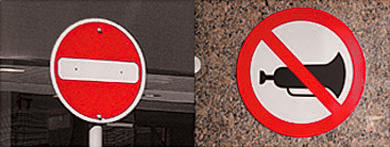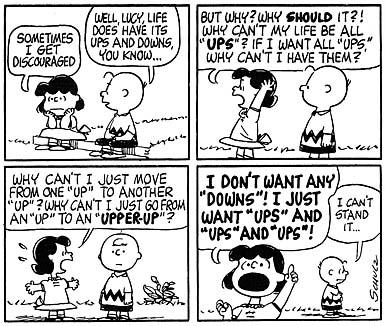The most common and obvious ways indeed, just in case some of you find it useful...
1. See if what you want to do violates Biblical teachingsThe Bible gives us an overall framework of what God likes and dislikes. There're clear ones and there're vague ones, and there're issues that the Bible not even touched. So the trick is how we understand the Bible as a whole and extract what we understand about God and apply it to what we face. We need System Theology here, which serve as overall guarding principles on how we understand the Bible. We need Biblical Theology too, which let us understand how God took things case by case according to different circumstances -- and what about our circumstances?
The problem here is that interpretation of the Bible can be extremely diverse and very often our "theology" dominates our understandings, but most often they are "crooked" understandings, which makes us cannot find an easy answer. Take your job as an example: We often have different views towards working in some not-so-ethical organization and often have uneasy feelings in our hearts as Christians. The 1st kind of viewpoint is that people refuse doing any job which has something to do with unethical issues, because they think they are participating, helping and involved in making the unethical thing happen. One example is that our previous Pastor thinks that people should not work for the Jockey Club since it advocates gambling, although the Club donated so much money for charity. The 2nd kind of viewpoint is that some people see the job by the job nature itself as described in your employment letter. Say you're a secretary or something, all you perform everyday is some work related to secretarial nature only, and the job nature itself has nothing unethical, just like any other secretary in any other company. Although the business nature of the company has some relation with the "unethical" stuff, it is this very-indirectness that some Christians think it's actually OK to work in these positions and places.
So it's your call and how you look at the job. I don't have a fix view on this since it is the amount of faith that you have on our Lord. To those who has 'more' faith, he may chose not to work there and he believes God will prepare him a better job which will have no conflict at all. To those who has "lesser" faith (it is not "wrong" or a sin to have lesser faith!), he may keep the job and pray that he will do her best in her post. I do encourage, but won't force people to be a child who have to have strong faith in the Lord, since that is a process of growth and it takes time. So you have to keep on looking for the Lord's guidance.
2. Pray to God and see if He gives you peace in any decision you madeSearch you feelings. Some people believe God will give them unrest in their hearts if they chose something God doesn't like. Yes, the Holy Spirit works like that very often. Of course, relying solely on this has the danger of being too subjective. The "peace" or "unrest" in our heart is also subject to our own interpretations and fluctuating emotions. But what's arguable is that our faith is not just a set of objective rules and principles, but also a subjective understanding of God and a personal relationship with Him. So there's nothing wrong with being subjective (I tell you what: there's no such thing as really objective in this world! The most objective view has to go through some subjective analysis, selection and deselection.), as long as you remember the 3rd way below.
3. Talk to brothers and sisters to find out how they see thisWe believe the Holy Spirit will work not only in one person's heart, but in all of ours, including Christians and non-Christians, implying that we'll have "similar" viewpoints inspired by the same Holy Spirit if He is to guide you through people around you, so you can get a better idea of the overall opinion, the pros and cons... It is wise to go to someone who is more experienced in similar issues, or understand more about how God do things.
To me another important reason why we need to talk to people around us is that what we do actually has an effect on them. We do something good, people will feel happy for us; we do something bad, people will feel troubled. So it's wise to find out their feelings before we make a decision. God placed us in the midst of these people so we're accountable to them. Like what Paul said, we're free to do anything, but not everything is beneficial to people. We have to use our precious freedom to choose wisely, not to do something just because we like to do but is hurting people around us.
4. Time will tellThis is not present tense while you're looking for God's view now. Since it is not now, this means you're free to choose according to your own preference at this moment. Until one day you find what you're doing is very "directly" contradicting God's way, then you stop and quit. Wait for the peace or unrest in your prayer, wait for people to come to you and they tell you a different view on what you're doing, wait until you read something new from the Bible. But before that, you can choose whatever you like. Follow your heart.
Hope this helps, and may the Lord guide you, and do share with me on how the Lord guide you in any other way.
Labels: 信仰
 我想起很多年 前看過明珠台的一集《The Twilight Zone(迷離境界)》,故事講述未來世界裡面有一條這樣的法律:犯了罪的人都會被機械警察在額上烙上印記一年,讓他身邊的人知道他是罪犯,在任何情況下 都不准與他交談或接觸(對,就是「當他隱形」,視若無睹),誰膽敢與他接觸的,便會遭受同樣處紛。起初這個罪犯還以此為一件樂事,恃著這法律公然闖進女性 浴室裡,誰知人家並不是真的看不見他,只是對他裝作視而不見,並著意迴避他... 直至有一天,他厭倦了這個沒有說話的世界,不斷找人說話,身邊的人卻仍然迴避他,拒絕回應他,叫他痛苦至一個跡近癲狂的地步,直至... 我暫且不告訴你故事怎樣完結!假若你曾經得罪了人,被人「當你透明」,用視而不見制裁你,你必定明白這個主角所經驗的痛苦。當然,要對人視若無睹亦不見得是一見樂事,唯有主耶穌所成就的復和才是叫人動容!
我想起很多年 前看過明珠台的一集《The Twilight Zone(迷離境界)》,故事講述未來世界裡面有一條這樣的法律:犯了罪的人都會被機械警察在額上烙上印記一年,讓他身邊的人知道他是罪犯,在任何情況下 都不准與他交談或接觸(對,就是「當他隱形」,視若無睹),誰膽敢與他接觸的,便會遭受同樣處紛。起初這個罪犯還以此為一件樂事,恃著這法律公然闖進女性 浴室裡,誰知人家並不是真的看不見他,只是對他裝作視而不見,並著意迴避他... 直至有一天,他厭倦了這個沒有說話的世界,不斷找人說話,身邊的人卻仍然迴避他,拒絕回應他,叫他痛苦至一個跡近癲狂的地步,直至... 我暫且不告訴你故事怎樣完結!假若你曾經得罪了人,被人「當你透明」,用視而不見制裁你,你必定明白這個主角所經驗的痛苦。當然,要對人視若無睹亦不見得是一見樂事,唯有主耶穌所成就的復和才是叫人動容! 不過說到底,還是老婆大人決斷英明:不准我帶同電腦旅遊。五天裡面我門每天留在酒店的時間還不到八小時,連睡眠和梳洗的時間都不夠,兼且我們渡假入住的酒店房間根本沒有網絡設施,還說甚麼上網?還是「死死地氣」專心一享天倫之樂和為論文看看書吧!謝謝老婆大人在適當時候給我這個犯賤的男人嚴加管教,被太太管束總比被她視而不見好啊!
不過說到底,還是老婆大人決斷英明:不准我帶同電腦旅遊。五天裡面我門每天留在酒店的時間還不到八小時,連睡眠和梳洗的時間都不夠,兼且我們渡假入住的酒店房間根本沒有網絡設施,還說甚麼上網?還是「死死地氣」專心一享天倫之樂和為論文看看書吧!謝謝老婆大人在適當時候給我這個犯賤的男人嚴加管教,被太太管束總比被她視而不見好啊!


















